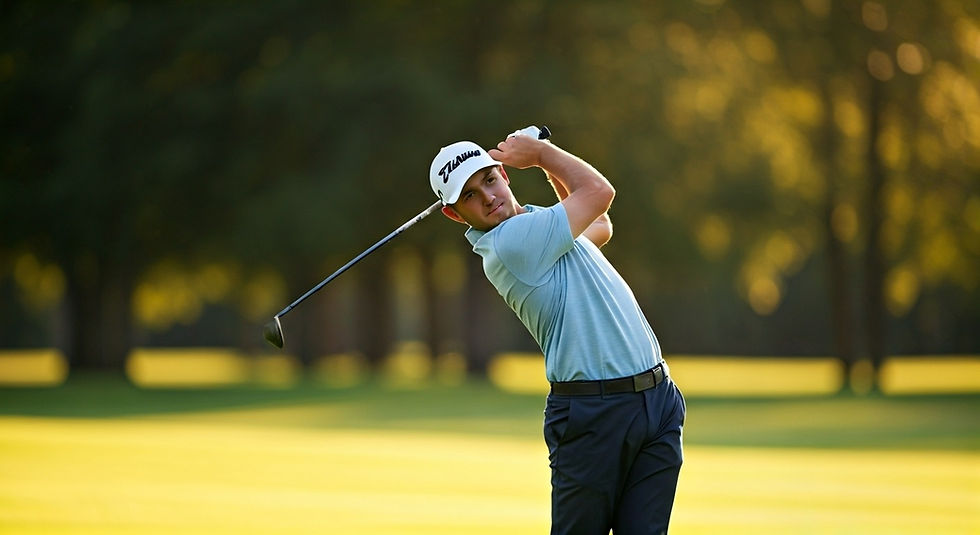How Sport Psychologists Can Help Golfers: A Comprehensive Guide
- Dr Paul McCarthy

- May 14, 2025
- 4 min read
Golf is as much a mental game as it is physical. Unlike fast-paced team sports, golf is slow, solitary, and leaves ample room for the mind to wander—making psychological resilience a key factor in performance. Sport psychologists specialize in enhancing mental skills, and their role in golf is indispensable.

This guide breaks down the ways sport psychologists support golfers, organized into the following sections:
⛳ 1. Understanding the Golfer’s Mental Game
Before implementing techniques, psychologists first assess the mental landscape of a golfer. This involves:
Mental Game Assessment
Interviews & Questionnaires: Used to identify stress triggers, pre-shot routines, emotional regulation skills, and general attitudes toward competition.
Observational Analysis: Watching the golfer in practice or competition to evaluate mental toughness, body language, and behavioral patterns.
Key Psychological Factors in Golf
Focus and concentration
Anxiety and pressure management
Confidence and self-belief
Resilience after failure (e.g., bad holes or missed putts)
Motivation and goal setting
Emotional control
🧩 2. Mental Skills Training for Golfers
A. Pre-Shot Routine Optimization
Purpose: Instills consistency, reduces anxiety, and shifts focus from outcome to process.
Psychological Interventions:
Mindful breathing before addressing the ball
Visualization of the shot
Trigger words or physical cues ("smooth," touching a glove)
B. Visualization & Imagery
Goal: Improve motor performance and confidence through mental rehearsal.
How it's used:
Visualizing the trajectory of shots before hitting them
Replaying successful shots in the mind to boost confidence
C. Focus and Concentration Techniques
Strategies:
Thought-stopping to counter intrusive thoughts
Attentional control drills: Narrowing focus during distractions (e.g., crowd noise or internal pressure)
Routine anchoring: Using consistent routines to lock into the present moment
D. Self-Talk and Cognitive Restructuring
Self-Talk: Encouraging inner dialogue ("I can handle this wind," rather than "I hate playing in this")
Cognitive Restructuring: Replacing negative thought patterns with neutral or positive ones (e.g., "I’ve practiced this shot a hundred times" instead of "I can’t miss again")
🌀 3. Anxiety and Pressure Management
Golfers often face situational pressure, especially during:
First tees
Clutch putts
Tournament play
Playoffs
Techniques Employed:
Progressive Muscle Relaxation (PMR): Tension-release cycles to regulate arousal
Mindfulness Meditation: Staying grounded in the moment
Breathing Techniques: Box breathing (4-4-4-4 count), diaphragmatic breathing to calm nerves
Simulation Training: Replicating high-pressure scenarios in practice sessions
💬 4. Confidence Building
Confidence is fragile in golf due to its variable nature.
Tools to Build Confidence:
Mastery Logs: Keeping records of well-played shots, rounds, and improvements
Performance Journals: Tracking routines, mindset, and self-talk to reinforce what works
Feedback Loops: Integrating feedback constructively instead of as self-criticism
Setting Achievable Goals: Breaking down performance into attainable steps
🎯 5. Goal Setting and Motivation
Types of Goals
Outcome Goals: Winning a tournament (long-term motivation)
Performance Goals: Achieving a specific score or percentage of greens in regulation
Process Goals: Maintaining tempo or routine on each shot
Motivation Strategies:
Intrinsic Motivation Focus: Emphasizing mastery and growth over external rewards
Motivational Interviewing: Used by psychologists to explore internal drive and commitment to practice or competition
🧱 6. Building Resilience and Mental Toughness
Golfers inevitably encounter slumps, injuries, or mental blocks (e.g., the yips).
Support Areas:
Coping Strategies: For failure, adversity, or frustration (e.g., reframing failure as feedback)
Mental Reset Routines: Techniques to "reset" mid-round after a poor hole
Growth Mindset Cultivation: Helping athletes adopt a “learn and improve” rather than a “win or lose” mindset
🛠️ 7. Recovery and Burnout Prevention
Managing Training Load and Expectations
Detecting mental fatigue or overtraining
Encouraging rest and balance
Building healthy identity beyond golf to reduce pressure from poor performance
📉 8. Dealing with Slumps and the “Yips”
The yips—a sudden, unexplained loss of fine motor skills—are often psychological.
Interventions:
Desensitization Techniques: Gradually exposing the golfer to pressure situations
Task Deconstruction: Breaking down skills into smaller, confidence-rebuilding components
Mindfulness & Acceptance Commitment Therapy (ACT): Allowing anxious thoughts to pass without engagement
📊 9. Teamwork with Coaches and Caddies
Sport psychologists collaborate with:
Swing coaches to align mental strategies with technical changes
Caddies to train supportive communication and strategic focus
Parents/Agents (for junior or elite golfers) to manage external pressures and expectations
🧍♂️ 10. Individualized Mental Performance Plans (MPPs)
Every golfer is unique. Psychologists tailor interventions based on:
Personality traits (e.g., perfectionism, introversion)
Learning style (visual, kinesthetic, auditory)
Competition level (amateur vs. pro)
Life context (student-athlete, tour professional, weekend golfer)
🧾 Case Example: Mental Plan for a Competitive Golfer
Area | Strategy | Tool |
Pre-Shot Routine | Consistency + confidence | Visualization + breathing |
Anxiety | Mid-round resets | Cue words + breathing drills |
Slump Recovery | Cognitive reframing | Reflective journaling |
Goal Setting | Tournament preparation | SMART goals: performance + process |
Confidence | Post-round analysis | Highlight reel journaling |
✅ Conclusion with Sport Psychologists
Sport psychologists are not only helpful—they're essential for golfers who aim to reach their full potential. From reining in nerves during competition to instilling daily confidence and motivation, the psychological edge often makes the difference between a good golfer and a great one.
Whether you're a weekend player or a tour pro, investing in mental training with a sport psychologist can dramatically elevate your game.








